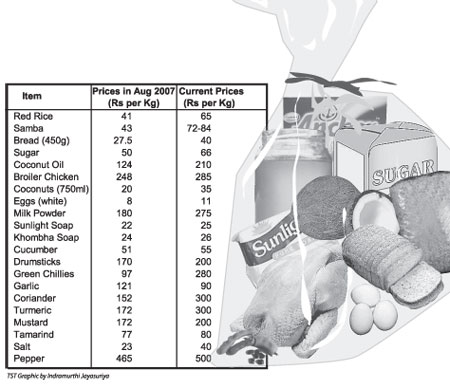
Consumers fighting a losing warWhile many talk of price hikes of essential items, the prices of most widely used items have also gone up in the past six months Good things no cheap, so the saying goes. But for us Lankans it seems more a case of nothing comes cheap. The cost of living is reaching dizzying heights and more price hikes are expected. While the people complain about sharp hikes in the prices of rice, sugar, wheat flour, vegetables, spices, gas, fuel and bread in recent months, many other items such as a cake of soap, have also gone up in price, largely unnoticed by consumers. A market survey shows that prices of popular brands of soaps have risen by three rupees over the past six months, while other commonly used items such as garlic, coriander, pepper, tamarind and varieties of vegetables have increased in price within the same period. The price of a litre of vegetable oil sold at Rs. 260 has shot up to Rs. 400 in the past two months, one housewife complained.
Red rice has increased by Rs. 23 a kilo, while white rice increased by Rs. 20 over the past six months.
The Colombo Consumer Price Index (CCPI) for January recorded that 96% of the increase in the expenditure was due to the rise in prices of food items.
Last week, the Department of Census and Statistics placed the official rate of inflation at 21.6 percent – which economic analysts say is the highest in South Asia. Two weeks ago, more bad news was on consumers’ way, when the government announced that electricity rates had to be increased at least by 40 percent to salvage the Ceylon Electricity Board from the financial mess it has found itself in. But, the government postponed the proposed electricity tariff hikes amidst growing public protests. CEB’s General Manager Ranjith Pulleperuma said a special committee which studied proposals submitted by experts and the general public would present a revised tariff structure to the Power and Energy Ministry this week. Last week, the urban household was dealt another blow, when Shell Gas Lanka Ltd (SGLL) increased the price of a 12 kg domestic cylinder of gas by Rs. 261. It now sells at Rs.1749. Shell’s competitor, Laugfs Gas, also increased the price of its product to Rs. 1721. Shell Gas Finance Director Rimoe Saldin said the company did not have a choice but to increase prices as the world market prices went up by 50% between September and December. He said the company wanted the new price at 1877 as freight charges also had to be added to it, but the Consumer Affairs Authority (CAA) refused to take this factor into consideration. Mr. Saldin said the company was still pressing ahead with its demand that the price should be increased by a further Rs. 128 to cover the increase in freight charges. However, government officials point out that there is a sharp discrepancy in the freight charges presented by Shell and Laugfs. In the midst of the uncontrollable cost of living, the government says it is helpless but trying its best to ease the burden on the people. Trade and Consumer Affairs Ministry Secretary R.M.K. Ratnayake said the government was looking into the possibility of importing essential food items such as milk powder and rice from less-expensive markets. Fuel price revision this month An increase in the price of fuel will be considered by the end of this month, Ceylon Petroleum Corporation Chairman Asantha de Mel said yesterday as world fuel prices hit record levels more than US$ 105 a barrel. He said the CPC at present was selling stocks purchased at lower prices earlier but it could not go on doing so as the corporation also needed money to repair the refinery. He said Sri Lanka used 145 million litres diesel a month compared to 40 million litres of petrol and as a result, petrol consumers had been forced to bear the burden of subsidizing diesel prices. Mr. de Mel said the CPC was now losing Rs. 12 on a litre of diesel. Before the crude oil price rise, the CPC was losing Rs.8 a litre but it managed to cope with the losses through the profits on petrol. Mr. de Mel said the CPC had made profits of about $5.6 million from hedging and would continue to get revenue from the re-opened refinery, allowing it to maintain the current price for this month. “We have no intention of increasing the prices this month, but at the end of the month we will review the situation and take a decision on the prices,” he said. The price hike and the India factor India’s policy of discouraging exports has affected the cost of living in Sri Lanka, Trade Ministry Secretary, R.M.K. Ratnayake said. He said India had stopped exporting sugar to bring down the prices in its domestic market.
Sri Lanka imported 100,000 metric tonnes of rice in 2007 and has not felt the need to import rice this year. Meanwhile, government officials said moves were underway to import milk from India. An official said importing India’s Amul milk was Rs.10 to Rs.15 cheaper than importing milk from Australia or New Zealand. |
|
||||||
|| Front
Page | News | Editorial | Columns | Sports | Plus | Financial
Times | International | Mirror | TV
Times | Funday
Times || |
| |
Reproduction of articles permitted when used without any alterations to contents and a link to the source page.
|
© Copyright
2008 | Wijeya
Newspapers Ltd.Colombo. Sri Lanka. All Rights Reserved. |
